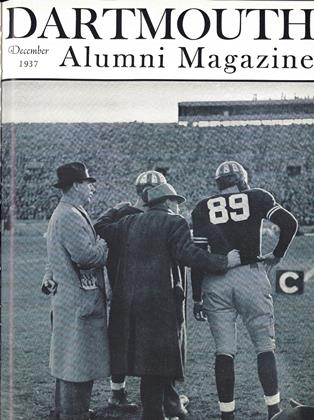ARMISTICE DAY ADDRESS OF PROFESSOR RICHARDSON '99IN ROLLINS CHAPEL LAST MONTH PUBLISHED
AT THE ARMISTICE DAY exercises in Rollins Chapel last month there were two principal speakers in addition to Prof. R. B. Chamberlin who conducted the services. Prof. James P. Richardson '99 spoke as did David J. Bradley '37, representing the undergraduates. Mr. Bradley's remarks are quoted in full in the UndergraduateChair this month. The address of Professor Richardson is published herewith:
Remarks even as brief as these are improved by a text. This is mine; "What we seek is the reign of law, based upon the consent of the governed, and sustained by the organized opinion of mankind." It is a quotation from one of President Wilson's noble war-time messages.
In the fall of 1918 the Dartmouth campus resembled, and indeed was, an armed camp. Officers of the regular army shared control of the management of the College with its regularly constituted administrators.
Intercollegiate athletics were adjourned except for a few informal contests.
Uniforms and guns were everywhere. A large part of what is now Memorial Field was cut up by trenches and criss-crossed by barbed wire entanglements, as the boys played a hateful game of mimic warfare.
Instead of footballs, they threw denatured trench bombs and grenades. The main floor of the gymnasium was a hospital ward. It was like a bad dream, from which the bells and whistles of the Armistice awakened us.
I pray to God fervently that those scenes may never have to be re-enacted; and, no doubt selfishly, that if they are, I may not be here to see them.
And yet, as we pause to think of those days, and to honor the memory of the Dartmouth men who died—whose names appear in glory on the great bronze tablets in the noble archway at Memorial Field, we must realize the more than possibility that "it can happen again"; and that it is conceivable that even worse alternatives may yet again force us into war as the lesser of two evils.
I can scarce believe that I am hearing myself correctly as I say the words. I was so sure, eighteen years ago, that the world —the large-scale world, was done with war; brutal, reckless, stupid war! But here we are, almost on the threshold of another conflict; with the nations which glorify war, as a good in itself, moving closer and closer together, spreading wider and wider, and challenging us either to accept their way of life or to battle.
A requirement made by the Government of the war-time Dartmouth (as of all other colleges) was that a course on "Issues of the War" should be taken by all students. This was of course thinly veiled propaganda, and is a sample of what war brings with it. But the authorities had sense enough not to be dictatorial as to the methods employed; and not even to go very far into the substance of the course; and I am proud to remember that here at Dartmouth, in the War Aims course, as everybody called it, we did a pretty fairly honest and self-respecting job, even in those hectic days.
We adopted as a sort of slogan for the course the quotation from President Wilson, which I stated as my text. "What we seek is the reign of law, based upon the consent of the governed, and sustained by the organized opinion of mankind"—
That was a worthy quest. That is the cause for which our brethren died. That so far it has not found realization, does not mean, to me, that it must or should be abandoned.
I can think of no pledge which today "would be a more suitable tribute to the spirit of the occasion than a rededication to that purpose.
REAL LAW NEEDED
There must be a substitute for war. Disputes and quarrels will continue to arise-Talk of disarmament seems visionary and impractical. Disarmament will be the result of world peace: not the cause of it. Diplomacy is not the same as justice. But that law—real law with sanctions in itshall sometime take the place of war, seems a conclusion warranted by the lessons of history, which show the gradual evolution of law as ending the resort to force in the adjudication of disputes of every kind other than those between the groups of men which we call nations.
The United States of America, despite the counsel of many of its wisest men, has been backward in lending its powerful aid to this cause. As I stand here, I can wish for nothing better than that the men of Dartmouth might be inspired—along with the youth of all countries—to work unitedly toward that goal, splendid but realizable.
We, of the Dartmouth of today, salute with reverant homage our heroic Dartmouth comrades of the Great War; and to them we pledge our steady commitment to the cause of an ordered peace through law; so that at the end of the road, and at long last, their mighty sacrifice may not have been in vain.
 View Full Issue
View Full Issue
More From This Issue
-
 Sports
SportsFollowing the Big Green Teams
December 1937 By "Whitey" Fuller '37. -
 Article
ArticleGradus Ad Parnassum
December 1937 By The Editor -
 Class Notes
Class NotesClass of 1914
December 1937 By Edward Leech -
 Class Notes
Class NotesClass of 1934
December 1937 By Martin J. Dwyer Jr. -
 Article
ArticleOld Families of Hanover
December 1937 By Eric P. Kelly 'O6 -
 Class Notes
Class NotesClass of 1935
December 1937 By William W. Titzhugh







